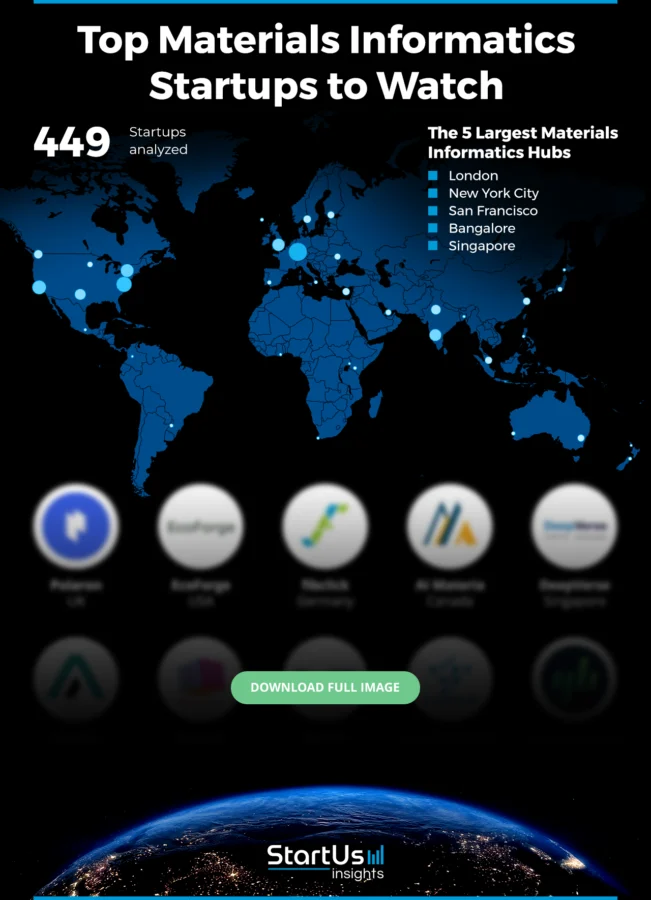Accelerate Productivity in 2025
Reignite Growth Despite the Global Slowdown
The materials informatics sector is estimated to reach USD 410.4 million by 2030, reflecting a compound annual growth rate (CAGR) of 19.2%. This surge is driven by the escalating demand for sustainable materials and the integration of artificial intelligence (AI) to accelerate material discovery and development.
In this article, we spotlight 10 top materials informatics companies to watch in 2025 – highlighting their contributions to this dynamic and rapidly evolving field.
Global Startup Heat Map highlights Emerging Materials Informatics Companies to Watch
Through the Big Data & Artificial Intelligence (AI)-powered StartUs Insights Discovery Platform, covering over 5M+ startups, 20K+ technology trends plus 150M+ patents, news articles & market reports, we identified 449 materials informatics startups.
The Global Startup Heat Map below highlights the 10 materials informatics companies and startups you should watch in 2025 as well as the geo-distribution of 449 material informatics startups & scaleups we analyzed for this research.
According to our data, we observe high startup activity in the US and India, followed by the UK and Germany. The top 5 Startup Hubs for Materials Informatics are London, New York City, San Francisco, Bangalore, and Singapore.

Explore Emerging Materials Informatics Companies to Watch in 2025
We hand-picked startups to showcase in this report by filtering for their technology, founding year, location, funding, and other metrics. These materials informatics startups work on solutions ranging from AI-enabled material design and product formulation assistance to superconducting devices.
- Polaron – AI-enabled Material Design
- EcoForge – Sustainable Binding Agents
- fibclick – Fiber-reinforced Lightweight Materials
- AI Materia – AI-powered Product Development
- DeepVerse – AI-led Material Identification & Optimization
- Aionics – High-Performance Materials Discovery
- SuperQ Technologies – Superconducting Devices
- RefFIT – Optical Property Analysis
- Substantial AI – Glass & Ceramics Research Platform
- Quantum Boost – AI-based Formulation Assistant
1. Polaron
- Founding Year: 2023
- Location: Thame, UK
- Use for: AI-enabled Material Design
- Notable News: Polaron was also shortlisted for USD 1.23 million Manchester Prize, which is a government-run competition supporting breakthroughs in artificial intelligence for the public good.
UK-based startup Polaron creates a material design tool driven by AI that uses microstructural imaging data to create prediction models for improving material performance.
It reconstructs 3D structures without costly imaging techniques by processing 2D micrographs using advanced segmentation algorithms to produce machine learning-ready datasets.
The platform recognizes patterns in the composition and structure of materials, which enables users to forecast new microstructures based on processing circumstances.
Polaron speeds up material discovery and optimization by incorporating AI-driven analysis, which lowers design time and experimental expenses.

It is beneficial in sectors like aircraft, energy storage, and additive manufacturing that depend on advanced materials.
The tool increases the precision of material property predictions and promotes sustainable development by providing engineers and researchers with a data-driven approach to material creation.
The startup enables the industry to produce high-performance materials more quickly while reducing dependency on trial-and-error testing.
2. EcoForge
- Founding Year: 2024
- Location: Somerville, Massachusetts, US
- Use for: Sustainable Binding Agents
- Notable News: Secured 3rd place in the Brown Venture Prize competition, earning USD 10K
US-based startup EcoForge replaces environmentally damaging adhesives with sustainable binding agents made from natural ingredients, computational chemistry, and AI.
Its AI4Science platform explores multiple possible chemical structures to find the most suitable molecular-scale cross-linkers that improve polymer performance, utilizing high-throughput screening and machine learning.
These binders remove harmful chemicals like formaldehyde while enhancing strength, durability, and resistance to environmental deterioration. EcoForge speeds up the switch to environmentally friendly adhesives for sectors including packaging, automobile production, and construction by utilizing AI-driven molecular discovery.
Its technique reduces environmental impact and dependency on petroleum-based chemicals by facilitating the quick prototyping of greener alternatives.
3. fibclick
- Founding Year: 2024
- Location: Augsburg, Germany
- Use for: Fiber-Reinforced Lightweight Materials
- Notable News: In 2025, fibclick was selected as one of the 20 finalists in the JEC Composites Startup Booster competition.
German startup fibclick specializes in fiber-reinforced lightweight materials by providing an advanced computer-aided design (CAD) solution for pultrusion-based manufacturing.
The startup’s software simplifies the complex and expensive process of fiber reinforcing by automating the design of production facilities for composite materials.
Its solution aids manufacturers cut down on manufacturing time, decrease material waste, and optimize production parameters by combining real-time simulations and computational modeling.
fibclick broadens the availability of lightweight, high-strength composites for industries including infrastructure, automotive, and aerospace by streamlining pultrusion technology.
The software enables engineers to build fiber-reinforced components without extensive knowledge of composite material science, increasing production efficiency and scalability.
The startup promotes sustainable innovation while enabling businesses to adopt high-performance composite solutions that improve mechanical qualities while lowering carbon footprints.
4. AI Materia
- Founding Year: 2020
- Location: Toronto, Canada
- Use for: AI-powered Product Development
Canadian startup AI Materia improves product development by using AI to speed up material and product innovation. The startup offers virtual experimentation and AI-driven data management to improve the design and testing process.
AI Materia improves material selection, formulation, and performance prediction by organizing and analyzing large databases to extract insightful information.
Its platform allows companies to perform virtual prototyping before actual implementation by combining experimental data and machine learning, which lowers the expense of trial and error.
This solution aids sectors like manufacturing, energy storage, and consumer goods by accelerating R&D cycles and ensuring high-performance results. AI Materia’s system regularly improves predictive models, which enhances decision-making and enables businesses to innovate effectively.
5. DeepVerse
- Founding Year: 2021
- Location: Singapore
- Use for: AI-led Material Identification & Optimization
Singaporean startup DeepVerse advances materials innovation by combining AI, computational techniques, and lab automation to accelerate research and development.
The startup’s technology enables quick material identification and optimization across various industries by combining theory-guided methods with data-driven insights.
DeepVerse’s tools support multi-format experimental data storage, enable interactive literature exploration, and employ adaptive algorithms to suggest optimal experimental pathways.
The platform predicts material properties and creates new materials with desired features by combining theory-guided and data-driven approaches. This method promotes digital transformation for businesses, maximizes experimental efficiency, and speeds up R&D processes.
It serves a diverse range of industries, such as energy, batteries, chemicals, semiconductors, polymers, alloys, catalysts, and healthcare.
Want to Explore 440+ Materials Informatics Startups & Scaleups?
6. Aionics
- Founding Year: 2020
- Location: Palo Alto, California, United States
- Use for: High-Performance Materials Discovery
- Notable News: In 2024, Aionics announced its venture into developing advanced batteries for electric aviation. This initiative is supported by investments from Trousdale Ventures, UP.Partners, MINTS (University of Michigan), and Avila VC.
US-based startup Aionics speeds up clean energy adoption by designing customized electrolytes for high-performance electrochemical systems utilizing physics-based simulations and AI.
The startup screens billions of formulations to identify optimal candidates customized to specific performance profiles. It accelerates the discovery of high-performance materials, particularly for electrochemical systems such as electric vehicles and aerospace batteries, long-duration energy storage, and decarbonized manufacturing.
Aionics improves the comprehension of special systems and data by creating interpretable models and providing professional consultancy to integrate the newest advancements in AI and machine learning. This promotes the wider adoption of clean energy solutions by developing innovations in long-duration energy storage systems.
7. SuperQ Technologies
- Founding Year: 2020
- Location: Bangalore, India
- Use for: Superconducting Devices Technology
Indian startup SuperQ Technologies advances the technology of superconducting devices by creating high-performance simulation models and creating experimental superconducting devices.
The startup develops and implements superconductor-based products that operate at high temperatures to achieve commercial viability across a range of applications.
Its products, such as SuperSens single-photon detectors, LTS cryo cables, and 2G HTS tapes, serve various applications, including HTS cables, magnets, and motors. These technologies benefit quantum technologies, materials research, healthcare, and sustainable energy and transportation sectors.
The startup’s fundamental technology aids in the development of integrated cryo coolers and control cryo electronics by fusing simulation models with experimental realizations.
8. RefFIT
- Founding Year: 2022
- Location: Geneva, Switzerland
- Use for: Optical Property Analysis
- Notable News: In 2022, RefFIT was awarded a grant loan from the Fongit Innovation Fund (FIF).
Swiss startup RefFIT offers a data analysis tool that uses a large library of dielectric-function models to fit optical spectra, including reflectivity, transmission, ellipsometry, and Kerr and Faraday rotation.
The solution includes more than 50 models and enables model-independent Kramers-Kronig analysis for a range of optical investigations.
RefFIT’s strong fitting engine, which is based on a modified Levenberg-Marquardt algorithm, supports numerous experiments and models at once with up to a thousand changeable parameters. Its intuitive interface allows for curve tracking, continuous graphical updates, and manual or automatic fitting of a variety of datasets.
This tool benefits physicists, material scientists, chemists, optics engineers, and educators by facilitating the analysis and modeling of optical properties in materials research and education.
9. Substantial AI
- Founding Year: 2021
- Location: New Delhi, India
- Use for: Glass & Ceramics Research Platform
Indian startup Substantial AI speeds up developments in the glass and ceramics industries with its Python for Glass Genomics (PyGGi) module. It uses machine learning methods and computational techniques.
It aids users create new glasses and comprehend intricate composition-property interactions with its modules like PyGGi Seer, PyGGi Zen, and PyGGi Bank. PyGGi Bank offers a composition-property database compiled from literature.
Whereas, PyGGi Zen finds novel glass compositions aimed at particular properties and limitations. PyGGi Seer makes composition-based predictions about glass properties.
It enables scientists and business experts to accelerate the creation of advanced glass materials, supporting innovation in fields like industrial manufacturing and consumer electronics.
10. Quantum Boost
- Founding Year: 2021
- Location: London, UK
- Use for: AI-based Formulation Assistant
UK-based startup Quantum Boost improves product formulation by offering an AI-powered assistant that accelerates the development of chemicals and materials. The platform utilizes advanced algorithms to speed up the formulation process, enabling rapid prototyping and optimization.
Quantum Boost enables users to gain immediate insights into experimental data and make informed strategic decisions with features like quick formulation, simpler experimental design, and AI-powered analytics.
The platform supports formulation, scale-up, stability testing, synthesis route optimization, and process optimization for a range of industries, including inks, paints, coatings, medicines, and specialty chemicals.
Quantum Boost improves product performance and shortens time-to-market while offering a data-driven strategy for resolving R&D issues.
Discover All Emerging Materials Startups
The materials startups showcased in this report are only a small sample of all startups we identified through our data-driven startup scouting approach. Download our free Materials Innovation Report for a broad overview of the industry or get in touch for quick & exhaustive research on the latest technologies & emerging solutions that will impact your company in 2025!



![10 Top Startups Advancing Machine Learning for Materials Science [2025]](https://www.startus-insights.com/wp-content/uploads/2025/06/Machine-Learning-for-Materials-Science-SharedImg-StartUs-Insights-noresize-420x236.webp)
![10 Emerging AI Solutions for Material Science [2025]](https://www.startus-insights.com/wp-content/uploads/2025/06/AI-Solutions-for-Material-Science-SharedImg-StartUs-Insights-noresize-420x236.webp)




